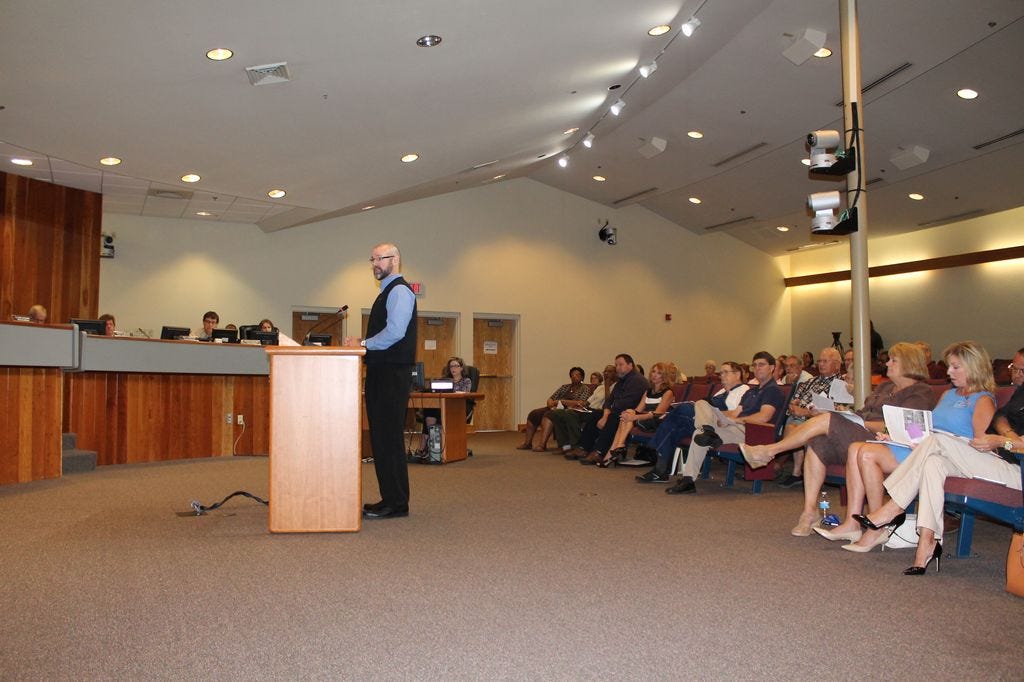
The Santa Rosa County Board of CountyCommissioners showed it is on board with public transportation in the county by moving to develop a plan to link public transit systems in Escambia and Okaloosa counties during Thursday’s BOCC meeting. The decision followed a presentation Tuesday by Shawn Ward, county transportation planner as well as public transportation supporters Bridges Out of Poverty President Karen Barber, and Pastor Brian Nall, representing the faith community.
Commissioner Bob Cole, one of the original commissioners who ended the county’s transportation service, early in the discussion Tuesday said he voted the way he did due to low ridership. “When I watched these buses day in and day out travel these routes most of the time with nobody in it, more often than not one or two people on it, my thoughts weren’t that we didn’t need transportation for these people but there’s got to be a better way to do this.”
Cole’s request last July for a look into the use of church vehicles, when Barber first presented to the BOCC on public transportation, led to Nall’s current work with the faith community for a transportation solution. Tuesday, Cole suggested the county work with the school district on fuel costs and ask repair facilities for help with vehicle maintenance, “if we get this thing moving forward. I’m not going to say if, I’m going to say when we get this thing moving forward.”
Commissioner Rob Williamson said he was interested in the post secondary education component of public transportation, and suggested the faith community focus on medical transportation while county-funded transportation look at fixed routes for University of West Florida, Pensacola State College, and Locklin Tech routes “where we can get folks the training they need to reenter the workforce or improve their standing within the workforce,” he said. I definitely think the time has come.”
Nall has said multiple times the faith based component to transportation would not try to meet the entire county’s needs, but fill gaps wherever they can. Tuesday, he compared the effort to the Mark 2:4 story of the four friends who try to bring a paralyzed friend to see Jesus. Due to the throng of people they have to get the paralyzed man to the roof then lower him through a hole. He said, “Our church, like so many others, is passing out food and clothing to our community, but part of that is also the need for those who are oppressed to be able to get from point A to point B.”
Dr. Anthea Amos, dean of the Pensacola State College Milton Campus, spoke Tuesday and said, “enormous numbers of students who come out of the k12 system with fully paid scholarships…have no way to get to that education. In addition, every semester we have hundreds of individuals, not just students, but adults who qualify for 100 percent Pell, and the Pell grants do not have to be paid back…Hundreds of students and individuals in the county, every semester, have no way to get to college.” Amos noted when PSC announced its new welding program, classes filled up with people going on a waiting list for January day and night classes. At a meeting earlier this year for community leaders on public transportation, Amos coined the phrase “free ride, but no ride.”
Commissioner Lane Lynchard noted the county needs two types of transportation, the door-to-door service for medical concerns and the fixed routes for secondary education. He also spoke from the perspective of the south end of the county and the congestion on Highway 98. “All you have to do is hop in your car in Navarre in the morning and try to make it to Hurlburt Field or FortWalton and see how long that trip takes and you realize that something’s going to have to be done to improve that road and lessen the number of trips on 98.”
Commissioner Jayer Williamson was the only commissioner not to speak regarding public transportation during the Tuesday meeting. After the meeting Tuesday, he said, “You have no heart if you’re not concerned” about those who can’t get to work or school. However, he said the county has no figures yet on how much it will cost. He echoed Cole’s previous concerns saying there was an outcry during the last run over buses travelling with sometimes only a single rider. He said it’s important those people who need transit get to school and work but he had to weigh this against good stewardship of tax dollars. With the county’s worries over its budget for next year, he said he was concerned this would be an avenue of sinking more money without an adequate return.
Barber and Nall had both asked for community support by attending Tuesday’s meeting. The BOCC auditorium was not full as Barber had hoped. She said she knew many who were unable to attend due to work and said she is sure people will ride if a new transportation system does come to the county. “I was really encouraged by the direction of the (BOCC) directed Shawn to go, especially for post secondary routes.” She said she also appreciated the faith based community’s support aiming to provide transportation to people with medical issues who have no ride. Considering the north end of the county, she said a shuttle may be an option but research into the critical fixed routes comes first.
With the county’s direction Thursday to move forward with research, Ward’s next step he said will be to communicate with ECAT and Okaloosa’s transit system to see how they can expand into Santa Rosa County.
This article originally appeared on Santa Rosa Press Gazette: Santa Rosa County greenlights public transportation research
